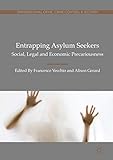Entrapping Asylum Seekers [electronic resource] : Social, Legal and Economic Precariousness / edited by Francesco Vecchio, Alison Gerard.
Material type: TextSeries: Transnational Crime, Crime Control and SecurityPublisher: London : Palgrave Macmillan UK : Imprint: Palgrave Macmillan, 2017Description: XVII, 276 p. 2 illus. in color. online resourceContent type: text Media type: computer Carrier type: online resourceISBN: 9781137587398Subject(s): Police | Transnational crime | Emigration and immigration | Criminology and Criminal Justice | Transnational Crime | Ethnicity, Class, Gender and Crime | Human Rights and Crime | Policing | MigrationAdditional physical formats: Printed edition:: No titleOnline resources: e-book Full-text access
In:
Springer eBooksSummary: This book is an interdisciplinary attempt to understand the contemporaneous human condition of asylum seekers through analysis of their entrapment and the resultant new forms of resistance that have emerged to combat it. Based on qualitative research data, the chapters support the claim that asylum seekers are entrapped in social, legal and economic precariousness amidst the complex relationship between individual agency and social structure. By exploring the practices and lived experiences of asylum seekers and other parties involved in their migration and reception, the authors explore the structural and individual agency factors that entrap asylum seekers in precarious livelihoods and lead to marginalization and social exclusion. A bold and timely study, this edited collection will be essential reading for academics and students of criminology, sociology, anthropology, urban studies and social policy.
TextSeries: Transnational Crime, Crime Control and SecurityPublisher: London : Palgrave Macmillan UK : Imprint: Palgrave Macmillan, 2017Description: XVII, 276 p. 2 illus. in color. online resourceContent type: text Media type: computer Carrier type: online resourceISBN: 9781137587398Subject(s): Police | Transnational crime | Emigration and immigration | Criminology and Criminal Justice | Transnational Crime | Ethnicity, Class, Gender and Crime | Human Rights and Crime | Policing | MigrationAdditional physical formats: Printed edition:: No titleOnline resources: e-book Full-text access
In:
Springer eBooksSummary: This book is an interdisciplinary attempt to understand the contemporaneous human condition of asylum seekers through analysis of their entrapment and the resultant new forms of resistance that have emerged to combat it. Based on qualitative research data, the chapters support the claim that asylum seekers are entrapped in social, legal and economic precariousness amidst the complex relationship between individual agency and social structure. By exploring the practices and lived experiences of asylum seekers and other parties involved in their migration and reception, the authors explore the structural and individual agency factors that entrap asylum seekers in precarious livelihoods and lead to marginalization and social exclusion. A bold and timely study, this edited collection will be essential reading for academics and students of criminology, sociology, anthropology, urban studies and social policy.
| Item type | Current library | Collection | Call number | Copy number | Status | Notes | Date due | Barcode |
|---|---|---|---|---|---|---|---|---|
| E-Books | MEF eKitap Kütüphanesi | Springer Nature | XX(1420373.1) (Browse shelf (Opens below)) | Available | NATURE | 1420373-1001 |
Browsing MEF eKitap Kütüphanesi shelves Close shelf browser (Hides shelf browser)

|

|

|

|

|

|

|
||
| XX(1420362.1) Privacy and Criminal Justice | XX(1420371.1) Re-Examining The Crime Drop | XX(1420372.1) Women in the Hong Kong Police Force Organizational Culture, Gender and Colonial Policing / | XX(1420373.1) Entrapping Asylum Seekers Social, Legal and Economic Precariousness / | XX(1420374.1) Timber Trafficking in Vietnam Crime, Security and the Environment / | XX(1420375.1) Performing Judicial Authority in the Lower Courts | XX(1420376.1) Domestic Homicides and Death Reviews An International Perspective / |
This book is an interdisciplinary attempt to understand the contemporaneous human condition of asylum seekers through analysis of their entrapment and the resultant new forms of resistance that have emerged to combat it. Based on qualitative research data, the chapters support the claim that asylum seekers are entrapped in social, legal and economic precariousness amidst the complex relationship between individual agency and social structure. By exploring the practices and lived experiences of asylum seekers and other parties involved in their migration and reception, the authors explore the structural and individual agency factors that entrap asylum seekers in precarious livelihoods and lead to marginalization and social exclusion. A bold and timely study, this edited collection will be essential reading for academics and students of criminology, sociology, anthropology, urban studies and social policy.
5
